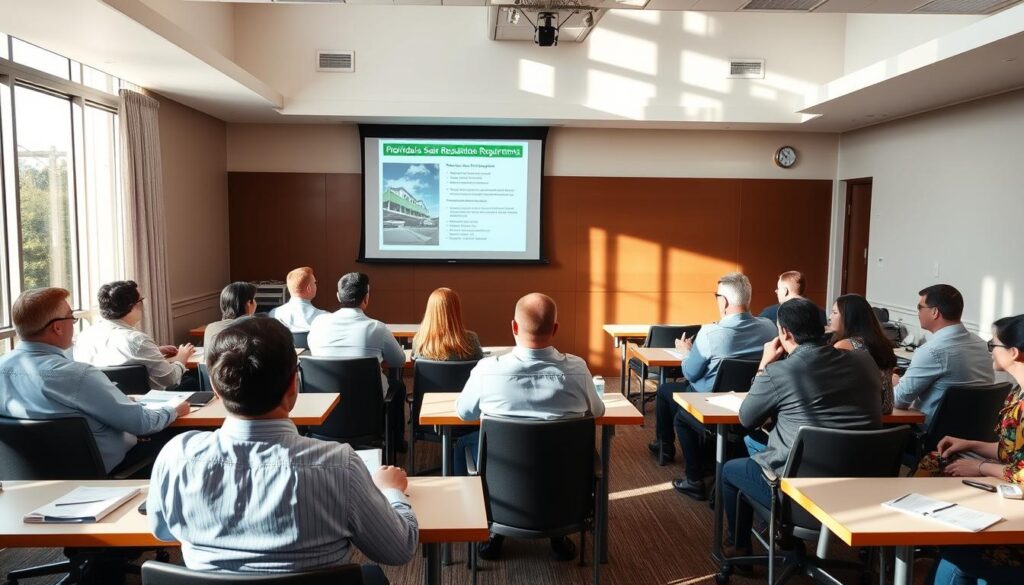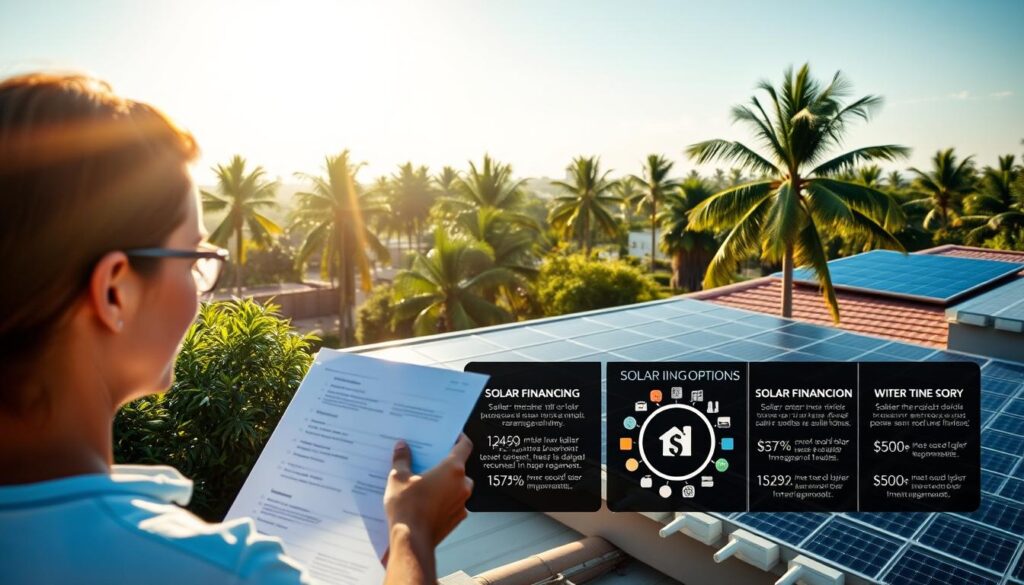In Florida, where the sun shines nearly year-round, the demand for solar energy solutions continues to grow. Securing a solar panel license florida is essential for contractors aiming to thrive in this market. This guide simplifies Florida solar regulations, from exams to compliance, ensuring you meet all requirements efficiently.
Florida’s licensing process requires candidates to pass exams offered three times annually—in February, June, and October. Applicants must register at least 30 days before their chosen date. To qualify, candidates need four years of experience, including one year as a foreman, or equivalent education and work combinations. Background checks and age requirements (18+) are also mandatory.
Solar systems in Florida enjoy tax exemptions, boosting home values when installed. However, local licenses are often needed in addition to state credentials. Understanding these Florida solar regulations helps avoid legal hurdles and ensures smooth operations.
Key Takeaways
- Florida administers solar exams in February, June, and October each year.
- Exam registration deadlines are 30 days before the scheduled exam date.
- Candidates must pass all exam parts within two years of their initial registration.
- Solar systems are exempt from Florida property and sales taxes, enhancing home value.
- Local licenses are required in many Florida municipalities alongside state credentials.
- NABCEP certification is preferred for accessing state incentive programs.
Understanding the Solar Panel License in Florida
In Florida, obtaining a solar contracting license or solar panel installation license is mandatory for anyone installing, repairing, or maintaining solar systems. These certifications ensure professionals meet state standards for safety and compliance. The Florida Department of Environmental Protection (DEP) oversees these licenses, ensuring solar energy systems operate safely and efficiently.
Ninety-five percent of applicants using LicensesETC successfully obtain their license on the first attempt without issues.
What is a Solar Panel License?
A solar panel installation license grants legal authority to work on solar systems, including photovoltaic panels, water heating, and pool heating. Florida offers two main licenses: the Certified Solar Contractor (CV) license for full-scale projects and the Specialty Contractor license for specialized roles. Both confirm the holder’s technical and financial readiness to handle solar projects.
Importance of Licensing
Licensing protects homeowners and businesses by ensuring:
- Safety standards for electrical and structural installations
- Compliance with state energy policies, like the 2025 Renewable Portfolio Standard
- Accountability for warranty and insurance coverage
Who Needs a License?
Businesses or individuals performing any of the following solar contracting license tasks must be licensed:
| Requirement | Details |
|---|---|
| Age | Must be at least 18 years old |
| Exams | Pass both Solar and Business/Finance exams |
| Experience | 4 years total, with 1 year supervisory role; education can substitute up to 3 years |
| Financial Proof | Provide credit reports for applicants and businesses |
Employees working under licensed contractors don’t need individual licenses. Always verify credentials before hiring to avoid legal or safety issues.
Types of Licenses for Solar Panel Installation
Florida’s solar contractor licensing in Florida system includes distinct categories tailored to project scope and specialization. Understanding these distinctions helps contractors choose the right path based on their business goals. Solar license requirements vary, impacting everything from project size to legal compliance.

Certified Solar Contractor License (CV)
This license, the most versatile option, permits statewide work on residential and commercial solar systems. Holders can install photovoltaic (PV), solar water heating, and pool heating systems. Requirements include four years of relevant experience, one year as a supervisor, and passing state exams. Harbor Compliance’s License Manager tool helps track renewal deadlines for this certification.
- Coverage: Full-scale solar projects across Florida.
- Exam focus: 50% on PV systems, 25% each on water and pool heating.
General Contractor License
General contractors with this license can handle structural aspects like roof integration but cannot perform electrical work. They must partner with licensed electricians for wiring and grid connections. This option suits firms focusing on building infrastructure rather than full solar system installation.
Specialty Contractor Licenses
Florida’s specialty licenses include the now-defunct RX certificate (replaced by CV/CW) and the CW license, which no longer accepts new applicants. Existing CW holders can still operate but cannot install PV systems. Specialty contractors must comply with local and state solar license requirements, including continuing education hours.
“Florida’s licensing shift aims to streamline compliance, ending local registrations by 2025 under House Bill 735.”
Registered licenses (local) will phase out by July 2025, pushing contractors toward statewide Certified Licenses. Choosing the right license ensures eligibility for state rebates and avoids legal penalties. Always verify current rules via the Florida DBPR website for updates.
Steps to Obtain a Solar Panel License in Florida
Securing a solar panel license florida involves a structured process requiring preparation, testing, and documentation. Here’s a clear path to navigate the requirements effectively.
Pre-Application Requirements
Before applying, candidates must meet:
- Age: Minimum 18 years old
- Experience: Choose one path:
- Four years of solar experience with one year as a foreman
- Combination of education (e.g., construction degree) plus hands-on work
- Military service: Three years active duty plus one year as a foreman
- Criminal background check via fingerprint submission
- Insurance proof: General liability and workers’ compensation
Application Process Overview
Follow these steps to finalize your application:
- Register for exams via Florida’s DBPR portal
- Pass both exams: solar panel license florida requires a 70%+ score
- Submit Form CILB 5-CW/CV with proof of experience, education, and insurance
- Pay fees (see table below) and await background check results
Fees and Processing Times
| Fee Type | Cost |
|---|---|
| Exam Fee (both tests) | $295 |
| Application Fee | $150–$250 |
| Project Type | Processing Time |
|---|---|
| Residential Solar | 2–6 weeks |
| Commercial Solar | 1–3 months |
| Large-Scale Systems | 3+ months |
Processing timelines depend on application completeness. Track status online through the DBPR portal to avoid delays.
Navigating the Examination Process
Preparing for Florida’s solar license exams requires strategic planning. Candidates must pass both the Business & Finance and Solar Trade Knowledge exams within two years of registration. Exams are offered in February, June, and October, with registration required 30 days in advance. These open-book assessments prioritize mastery of solar license exam preparation
Over 96% of students using Exam Pro’s courses pass on their first attempt.
Preparing for the Exam
Start with official study guides and CILB-approved resources. The solar license requirements include passing both exams with 70% accuracy. Key study tools include:
- The $600 Exam Prep Package (11 books + online access)
- Practice tests simulating 6.5-hour and 4.75-hour testing conditions
- Instructor support via phone/Zoom for tricky topics like tax law or electrical codes
Candidates scoring below 70% can retake exams at $215 per attempt (state fee + Pearson Vue fee).
Exam Content Overview
The Business exam tests 120 questions on:
- Contract management (5-7 questions)
- Tax obligations (6-8 questions)
- Insurance requirements (4-6 questions)
The Technical exam covers 80 questions on system design, safety protocols, and code compliance. Both exams allow open-book use but require quick reference skills.
Tips for Success
Time management is critical. Use the first 15 minutes to skim questions, then tackle familiar topics first. For the Technical exam’s safety sections, focus on OSHA protocols and troubleshooting scenarios. Need extra study time? The 1-year online access option includes 1,500 practice questions. Remember: unanswered questions count against your score, so mark and revisit uncertain items last.
Continuing Education Requirements
Maintaining solar contractor licensing in Florida demands ongoing learning. Florida’s solar regulations require certified professionals to complete continuing education (CE) to keep licenses active. Every two years, contractors must earn 14 hours of approved training.

Of the 14 hours, 1 hour each must cover workplace safety, business practices, workers’ compensation, and Florida laws. The remaining 10 hours focus on solar-specific topics like installation updates or code changes. Contractors in Miami-Dade need an extra 8 hours on local codes, while Broward adds 4 hours on county laws.
- 1-hour core topics: Safety, legal rules, and business practices
- 10+ hours in solar technology, regulations, or industry trends
- County-specific modules for Miami-Dade and Broward
Approved providers like the Florida Solar Energy Industries Association (FlaSEIA) offer courses online or in-person. The Florida Construction Industry Licensing Board (CILB) maintains a database to verify course eligibility. Renewals are due August 31st—certified licenses in even years, registered in odd years. Missing deadlines or course hours can lead to license suspension.
Staying updated through CE ensures compliance with Florida solar regulations and positions contractors as experts in this booming market. Explore options early to avoid last-minute stress and keep your certification active.
Regulations Governing Solar Panel Installations
Florida’s solar energy landscape is shaped by both statewide mandates and local rules. Contractors holding a solar panel installation license must comply with evolving Florida solar regulations, including upcoming changes like House Bill 735, which shifts licensing authority to the state by July 2025. Understanding these layers ensures legal compliance and project success.
State Regulations Explained
- Florida Building Code (8th Edition 2023) governs structural and safety standards for installations.
- National Electrical Code (2020) and Florida Solar Energy Center (FSEC) certifications are mandatory for equipment.
- Solar collectors must be black to optimize heat absorption under state law.
- Florida Statute 163.04 forbids HOAs from outright blocking solar systems but allows reasonable placement rules.
Local Ordinances and Considerations
Local governments enforce unique rules like setback requirements, roof pitch restrictions, and wind load standards (ASCE 7-16).1 for ground systems). Coastal areas may demand hurricane-resistant designs exceeding state baselines. Permits for systems over $5,000 require a Notice of Commencement filed with Lee County, costing $150–$400.
“Homeowners cannot be denied solar installation but must follow HOA guidelines that don’t hinder efficiency.”
Contractors must track local zoning boards’ variations. For example, Miami-Dade mandates 10-foot setbacks from property lines, while Tampa enforces stricter shading analyses. Permit applications need three collated plan sets and an Owner-Builder Disclosure if unlicensed.
Financing Options for Solar Panel Installations

Contractors with a solar contracting license play a key role in guiding clients through Florida’s solar financing landscape. Understanding how to get a solar license in Florida ensures professionals stay informed about programs like federal tax credits and local rebates. Let’s explore how these options simplify the transition to solar energy.
Understanding Incentives and Rebates
Florida’s incentives slash upfront costs dramatically. The federal Investment Tax Credit (ITC) covers 30% of installation expenses, while state law exempts solar systems from property taxes. BrightSave™ offers flexible plans like $0-down monthly options or a prepaid model with 25 years of maintenance included. Homeowners also gain equity: a 2024 study notes solar panels boost home sale prices by 6.8%.
A 6.8% home value increase proves solar is a smart investment.
Financing Programs Available in Florida
- BrightSave™ Loans: $0 down with 25-year coverage for repairs and monitoring.
- BrightAdvantage™ Loans: Low-interest options starting at 6% APR with terms up to 30 years.
- PACE Financing: Repay solar costs through property taxes, ideal for long-term homeowners.
- FHA 203(k): Renovate and solarize homes with loans up to $25,000.
Florida’s average 11kW system costs $21,092 post-tax credits, making these programs accessible. Licensed contractors (solar contracting license) can also highlight rebates like Austin’s $2,500 incentive for education-compliant installations. With over 255,000 Floridians choosing solar via companies like Sunrun, smart financing choices drive adoption.
Resources for Solar Contractors
Staying ahead in solar contracting requires leveraging resources that simplify licensing and operations. Florida’s ecosystem of professional networks and digital tools helps contractors meet solar contractor licensing in Florida mandates and improve their solar panel installation license compliance.
State and Local Trade Associations
Trade groups provide critical support for Florida solar professionals:
- Florida Solar Energy Industries Association (FlaSEIA): Advocates for solar policies and offers licensing updates.
- Florida Solar Energy Center (FSEC): Oversees certification programs and equipment standards per Florida Statute 377.705.
- National partners like SEIA and NABCEP: Provide certifications and networking opportunities aligned with state regulations.
Online Tools and Networks
Tools like Aurora for system design and PermitFlow for permitting streamline workflows. Professional networks such as LinkedIn solar groups and Energy Sage forums foster knowledge sharing. Educational institutions including Erwin Technical College (Tampa) and Indian River State College (Fort Pierce) offer courses that align with licensing standards. FSEC’s FSECstd 101-15 standards ensure equipment meets state requirements, supported by certified labs like SRCC and IAPMO.
Common Challenges and How to Overcome Them
Florida’s solar industry thrives when contractors address both regulatory demands and customer needs. Understanding solar license requirements ensures compliance, while ongoing solar license exam preparation keeps teams updated on evolving standards. Proactive strategies turn hurdles into opportunities for success.
Regulatory Hurdles
Homeowners’ associations often impose design restrictions, but Florida’s Solar Rights Act limits prohibitions on installations. Contractors can streamline HOA approvals by showcasing mockups that align with aesthetic guidelines. Permitting varies by county, so maintaining relationships with local authorities speeds approvals. All panels must withstand 150 mph winds, so technical compliance ensures safety and regulatory alignment.
Client Education and Expectations
Customers may worry about costs and performance. Educate them on the 30% federal tax credit and potential 4–11% property value boost. Transparent discussions about annual maintenance costs ($100–$500) and net metering’s impact on bills build trust. Highlighting long-term savings helps counter upfront cost concerns, while addressing seasonal energy fluctuations clarifies realistic output expectations.
